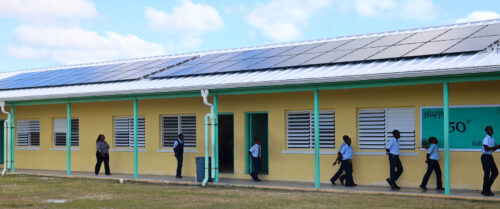
The Bahamas Bolsters Hurricane-Resilient, Clean Energy at Three Primary Schools and Lays Foundations for Scaling
Through solar and storage projects, national energy buildings audits, and solar training programs, The Bahamas is showcasing how clean energy can make the country more resilient and energy independent, while slashing energy costs — and how to plan for scale.
Abaco, Bahamas, May 12
Yesterday, The Bahamas held a ribbon cutting ceremony to celebrate tangible strides toward bolstering through solar and battery storage energy systems at three primary schools that also serve as emergency hurricane shelters to the community of Abaco. Recently named 2023 “Best Energy Resilience Project” in the Caribbean, the systems supply the schools with an average of 90% of their daily energy needs. In addition to the Abaco primary school initiative, The Bahamas’ efforts to scale clean energy access through a newly launched solar and energy auditing training program to build local skills and expertise were highlighted at the ceremony.
Given The Bahamas’ geographical location, it is incredibly susceptible to climate change impacts today, including increasing severe hurricanes and sea level rise. Traditional fossil fuel-based systems work against the nation as gas and oil must be shipped out to various family islands with small populations, making it difficult to transport fuel, necessary to power critical services such as pharmacies and hospitals, during extreme weather events. Furthermore, the Abaco Islands were severely impacted by Hurricane Dorian in 2019 as more than 75% of homes were damaged and 60 lives were lost (out of the 70 total for the entire country).
The Abaco community is still rebuilding, and these primary school “resiliency hubs” are a momentous step forward in helping instill confidence in the community for the next large storm and during routine outages, explained Deborah Clarke, Principal at Man-O-War Cay Primary School. “Since having the solar system, one night, when all the power was off on the Cay, I looked across the road and there was our beacon of light sitting right there in our school,” she shares. “Our school had light because of solar energy with battery energy storage — it allows life to continue.”
The following Abaco primary schools were a part of the project, made possible with support from the Center for Disaster Philanthropy and Rotary Bahamas Disaster Relief, and our local technical partners, Ministry of the Environment & Natural Resources and Compass Solar.
- Central Abaco Primary School
- Man-O-War Cay Primary School
- Great Guana Cay Primacy School
The ribbon cutting was held at Central Abaco Primary School with 50 faculty members and over 400 elementary age students.
“We are here today to remember what was lost [from Hurricane Dorian] and to celebrate a new era in the lives of Abaconians. With the installation of these solar and battery back-up systems across these Abaco schools, we are indeed moving into a new future, a new day.” said Bahamian Deputy Prime Minister, Hon. I. Chester Cooper.
EPC contractor, Compass Solar and its lead, Philipp Feller, noted that while solar energy is gradually becoming integrated in Bahamian households, businesses and now schools who recognize technology as cost competitive and having long-term impacts on growing energy costs, solar is still seen by most citizens as a luxury.
“Using diesel instead of investing in solar to power our schools and homes, as we know by now, is detrimental to the environment. Further, installing solar is a smart investment with huge dividends, and companies and solar consumers are doing their part to close the educational gap,” Feller said.
In efforts to expand clean energy impact, last month the government, with support from the Green Climate Fund (GCF) and alongside RMI as a GCF Readiness Delivery Partner, launched a solar assessment and energy auditing training program to support 20 selected participants from Bahamian universities, the electric utility, and government in building the skills required to realize clean, resilient energy at scale. This capacity building initiative will prepare the cohort of Bahamian engineers, technicians, electrical contractors, and other professionals to actively participate in the country’s pursuit of its sustainable energy goals by providing them with training in solar PV assessment and energy efficiency.
“From piloting the region’s first-of-its-kind Category 5 hurricane-resilient solar power system in Ragged Island and a solar canopy at the national stadium to now expanding local clean energy participation with the solar trainings, The Bahamas is showcasing tremendous commitment and progress toward realizing energy resilience in a way that benefits all Bahamians,” said Chris Burgess, RMI Islands Energy Program Director of Projects. “RMI has been proud to support efforts for the last eight years.”
For media inquiries, please contact:
Tierney Sheehan, Communications Lead for RMI’s Islands Energy Program
T: +1 858 735 1169
E: tsheehan@rmi.org
Khashan Culmer, Poitier Group
T: 242.698.1871 or 242.465.4575
About Compass Solar
Compass Power is a turnkey EPC solutions provider for energy systems in the Caribbean. Its renewable subsidiary, Compass Solar specializes in commercial/utility solar and microgrid projects having completed +5MW of solar installations with a further 5MW under contract as the leading Bahamian choice for renewable EPC Projects. For more info: compass-power.com or visit us on social media.
About RMI
RMI, founded as Rocky Mountain Institute, is an independent nonprofit founded in 1982 that transforms global energy systems through market-driven solutions to align with a 1.5°C future and secure a clean, prosperous, zero-carbon future for all. We work in the world’s most critical geographies and engage businesses, policymakers, communities, and NGOs to identify and scale energy system interventions that will cut greenhouse gas emissions at least 50 percent by 2030. RMI has offices in Basalt and Boulder, Colorado; New York City; Oakland, California; Washington, D.C.; and Beijing. More information on RMI can be found at www.rmi.org or follow us on Twitter or Facebook @RMICaribbean.